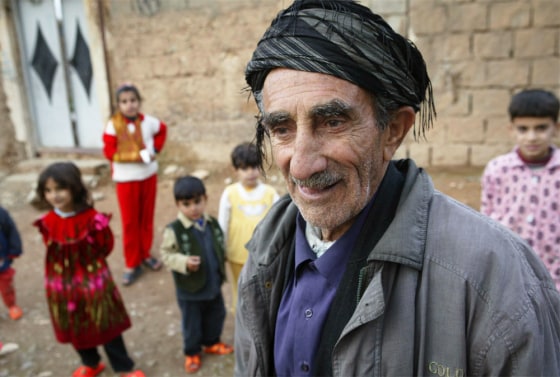Amna Abdulqader lost two sons, a daughter, a daughter-in-law and three grandchildren when bombs carrying poisonous gases fell in a chemical attack Saddam Hussein ordered on this Kurdish town — killing 5,000 people.
She and other survivors of the March 16, 1988, attack say the former dictator must face justice in an Iraqi court that could impose the death penalty.
“If he had fallen into my hands, I would have bitten off his flesh with my teeth,” Amna Abdulqader said Wednesday.
Some interim Iraqi leaders have suggested Saddam could be executed as early as this summer. But international human rights organizations reject the death penalty for Saddam and say his trial should be used as a starting point for healing the country.
Iraq’s U.S.-appointed Governing Council met for the first time Wednesday to look into ways of appointing judges to a new war crimes tribunal that could try Saddam.
One council member, Adnan Pachachi, said Iraq’s tribunal would welcome “foreign judges if we feel it’s necessary.”
Saddam was captured on Saturday, but he is in U.S. custody and the timeline and format of a possible trial has yet to be established.
The U.S.-led occupation authority suspended the death penalty, and Iraqi officials have said they will decide whether to reinstate it when a transitional government assumes sovereignty as scheduled by July 1.
President Bush says Saddam deserves the “ultimate penalty” for his crimes, but that it’s up to the Iraqi people.
'Just and comprehensive' trial
Amna Abdulqader said Saddam should be tried and hanged in the Halabja town square where there is a memorial statue of Omar Khawra, depicted lying dead and covering the body of his dead baby boy — a symbol of the street scenes after the gas attack.
She showed a picture of her son, Bakr, who was just 18 when he died. “He did all my shopping, took good care of me.”
“Even if they hang him, my children will never come back,” she said.
Abdulqader Hassan Mohammed, carries a picture in his wallet of his 3-year-old daughter, Narmin, who died as a result of the poison gas attack, part of Saddam’s scorched-earth campaign to wipe out a Kurdish rebellion in northern Iraq.
Saddam’s trial ought to be “just and comprehensive,” Mohammed said. “’Just’ means that he has to be executed. If they don’t hang him it won’t be just. Five thousand innocent people were killed. It will be a mistake if he’s not sentenced to death.”
Narmin, his daughter, died in her mother’s arms in Taran, Iran, where 50 members of the extended family fled across the mountains from Halabja after the attack.
Mohammed’s three surviving sons, Asou, 22, Ahmed, 21, and Othman, 24, still suffer effects of the gas attack. Othman is being treated in Britain.
“I would like to pour boiling oil on Saddam’s head and cut his flesh into pieces,” said Mohammed’s wife, Nesrin, 43.
Amna Abdulqader said she and other Kurds were ready to testify against Saddam. “My children died without being guilty. If everyone else testifies, I will too,” she said.
Her granddaughter, Alwan Noorwari, now 22, was 8 when her parents, sister and two brothers perished.
Noorwari, who still suffers from shortness of breath, said an Iraqi court is better than an international one, but it would be “better if they hand him to the people of Halabja to try him.”
“If they leave it to human rights groups, they will do nothing to him,” the granddaughter said.
Noorwari was holding her younger sister’s hand when the gas bombs fell. Her father was in bed with a back injury. Their house was full of people.
“There were sounds of bombs and rockets. My mother shouted to us to come back inside the house. We went into my father’s room,” said Noorwari.
A bomb had fallen into her uncle’s house next door. Everyone in Noorwari’s house went into the bomb shelter, except for her mother who ran to the brother’s house.
When the sisters came out of the shelter they found two dead birds in the yard. Noorwari and her sister, Diyar, 4, went to poke at it. When she heard of Saddam’s capture Saturday, Alwan danced and hugged her grandmother. Her uncle bought two pounds of chocolates and passed it around the neighborhood.
Kurds here declared a three-day holiday marking Saddam’s capture. Celebratory gunfire still rings through the city, and men do Kurdish folk dances in the streets well into the night.
